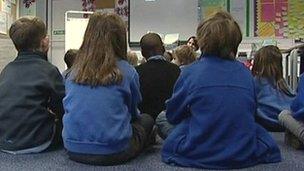Primary school place demand set to rise
- Published

The figures update predictions made in January
England's primary school population is set to rise by 18% in the next eight years, experts are predicting.
And by 2015, numbers are expected to grow by 8%, according to <link> <caption>statistics </caption> <altText>link to DfE</altText> <url href="http://www.education.gov.uk/researchandstatistics/statistics/a00211339/national-pupil-projections-july-2012" platform="highweb"/> </link> from the Department for Education.
Secondary school numbers have been falling and will continue to do so until 2015, when the surge in primary pupils will start to feed through.
The government has pledged to spend more than ÂĢ4bn in the next four years on creating new school places.
Labour says the figures confirm there is a crisis in school places, but Schools Minister Lord Hill has accused Labour of ignoring warnings about population growth when in power.
Other recent projections said 450,000 new primary places would be needed in England by 2015.
There are hot-spots of need around the country, with London under the most pressure.
In London, by 2015, the primary age population is expected to be 18% higher than it was in 2010.
But the growth is not only expected in the South East. In the North East and South West, primary numbers are expected to rise by 9% over the same time.
'Warnings ignored'
England's birth rate has been rising since 2002 and is expected to continue to grow, the statisticians say.
The government says its policies of allowing good schools to expand and of creating new free schools should help.
Schools Minister Lord Hill has accused Labour of ignoring warnings about population growth and future shortages when it was in power.
"The last government knew there was an issue as early as 2004 but sadly did nothing," he said.
"Worse than that, they actually cut funding for new places while squandering millions on expensive secondary schools.
"Unlike Labour we are taking the determined action needed to deal with this problem by spending more than ÂĢ4 billion on extra primary places."
Critics say the government's free school programme will not meet the need for places.
Local authorities have a legal duty to provide places for children, but are facing many changes in the organisation and creation of schools.
Some saw their plans for new schools or the re-building of existing ones scrapped with the cancellation of the Building Schools for the Future programme, which the coalition said was too expensive and bureaucratic.
Labour's Shadow Education Secretary, Stephen Twigg said: "Today's figures confirm the crisis in primary places in England. Many schools are at breaking point with pupils potentially being taught in warehouses and empty shops.
"Labour have been warning the government for months about the huge shortfall in places.
"But instead of addressing this crisis head on, the government has slashed the capital budget by nearly two thirds and are creating free schools, many of which are in areas where there isn't a demand for extra places or from parents."
- Published11 April 2012
- Published5 April 2012
- Published10 January 2012